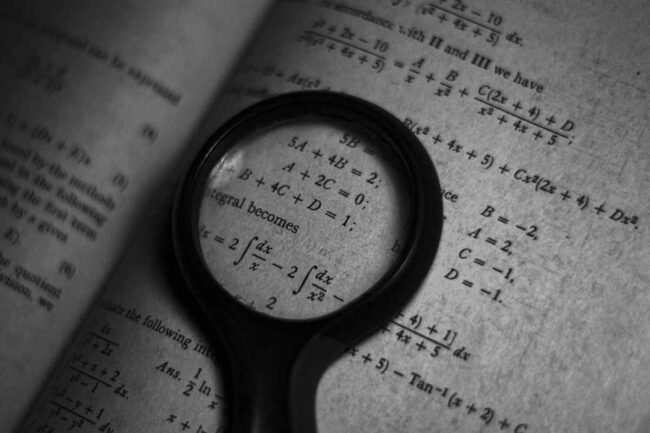As you embark on your journey through advanced mathematics, you’re stepping into a realm where logic meets creativity, and problem-solving becomes an art form. Edexcel A-Level Maths is not just about crunching numbers; it’s about unlocking the beauty and intricacy of mathematical concepts while honing your analytical skills to tackle real-world challenges.
Here at Ignite Training Institute, we understand the importance of a strong foundation in mathematics for your academic and professional success. That’s why we’re proud to offer comprehensive tutoring support for Edexcel A-Level Maths in Dubai.
Our team of experienced tutors is dedicated to guiding you through the Edexcel syllabus, helping you grasp complex concepts, and preparing you for the rigors of A-level examinations
Table of Contents
- What Is Edexcel A-Level Maths?
- Assessment Objectives Of Edexcel A-Level Maths
- Edexcel A-Level Maths Syllabus
- Edexcel A-Level Maths Grade Boundaries
- Qualification Structure & Features
- Exam Techniques & Preparation Tips For Edexcel A-Level Maths
- Ignite Training Institute – Edexcel A-Level Maths Tutoring Support In Dubai
- FAQs
- Conclusion
What Is Edexcel A-Level Maths?
Edexcel A-Level Maths is an advanced level qualification offered by Pearson Edexcel, one of the UK’s leading examination and awarding bodies. This rigorous program is designed to provide students with a deep understanding of mathematical concepts, techniques, and applications.
The course covers a wide range of topics, including pure mathematics, mechanics, and statistics, enabling students to develop both theoretical knowledge and practical problem-solving skills.
Edexcel A-Level Maths is highly regarded by universities and employers alike, as it demonstrates a high level of analytical thinking, mathematical reasoning, and quantitative skills.
Students who pursue this qualification will not only enhance their academic profile but also open doors to a variety of career opportunities in fields such as engineering, finance, computer science, and more.
Assessment Objectives Of Edexcel A-Level Maths
Assessment Objectives (AOs) in Edexcel A-Level Maths serve as guidelines for evaluating students’ proficiency and understanding across various dimensions of mathematical knowledge and skills. The three main AOs—AO1, AO2, and AO3—outline different aspects of mathematical learning and application.
Related: A-Level Maths: Topics & Exam Preparation Tips For Student
AO1: Using & Applying Standard Techniques
- AO1 focuses on students’ ability to use and apply standard mathematical techniques effectively. This involves demonstrating proficiency in fundamental mathematical operations, including algebraic manipulation, differentiation, integration, trigonometric functions, and more.
- Students are expected to not only execute these techniques accurately but also to apply them appropriately to solve a variety of mathematical problems.
- This AO assesses the practical application of mathematical knowledge in familiar and unfamiliar contexts, showcasing the ability to recognize patterns, select appropriate methods, and carry out calculations accurately.
AO2: Reasoning, Interpreting, & Communicating Mathematically
- AO2 emphasizes students’ capacity for logical reasoning, mathematical interpretation, and effective communication of mathematical ideas. Beyond mere calculation, this objective evaluates the depth of understanding demonstrated by students in explaining mathematical concepts, making conjectures, and justifying solutions.
- It involves analyzing mathematical structures, identifying relationships, and providing coherent explanations using mathematical language. Effective communication skills are crucial, as students must convey their mathematical reasoning clearly and concisely through written explanations, diagrams, and symbolic representations.
AO3: Solving Problems Within Mathematics & In Other Contexts
- AO3 assesses students’ problem-solving abilities both within mathematical contexts and in real-world situations. This objective challenges students to apply mathematical principles creatively to solve complex problems, demonstrating resilience, adaptability, and strategic thinking.
- This may involve modeling real-life scenarios mathematically, devising problem-solving strategies, and evaluating the reasonableness of solutions.
- Additionally, AO3 encourages students to recognize the relevance of mathematics beyond the classroom, illustrating its applications in various fields such as science, engineering, economics, and social sciences.
Related: Cambridge A-Level Courses: Explore All Your Subject Options
Edexcel A-Level Maths Syllabus
The Edexcel A-Level Maths syllabus is designed to provide students with a comprehensive understanding of fundamental mathematical concepts and techniques while also challenging them to apply their knowledge to solve complex problems.
The syllabus is structured to cover a wide range of topics across pure mathematics, mechanics, statistics, and discrete mathematics, ensuring that students develop a strong foundation in mathematical principles and their real-world applications.
Related: A Level Maths Grade Boundaries Explained: A Number’s Guide
1. Core Mathematics
The core mathematics component forms the basis of the A-Level Maths syllabus. It covers essential topics such as algebra, calculus, trigonometry, and sequences. Students delve into concepts such as functions, differentiation, integration, and exponential functions, building upon their prior knowledge from the GCSE level and laying the groundwork for more advanced mathematical study.
Related: A-Level Grading System Explained: From A* To E & Beyond
2. Further Pure Mathematics
The further pure mathematics component extends students’ understanding of mathematical concepts beyond the core syllabus. It introduces topics such as complex numbers, matrices, proof, and further calculus. Students explore abstract mathematical ideas, develop their problem-solving skills, and gain insight into advanced mathematical reasoning.
Related: A Level Computer Science Course: A CIE & AQA Overview
3. Mechanics
The mechanics component focuses on the application of mathematical principles to physical phenomena. Topics covered include kinematics, forces, Newton’s laws of motion, moments, and circular motion. Through studying mechanics, students learn to analyze and solve problems related to the motion and interactions of objects, preparing them for further study in physics and engineering.
Related: A-Level Subjects & Choices For Best Subject Combinations
4. Statistics
The statistics component introduces students to the principles of data analysis and probability. Topics include statistical sampling, data presentation and interpretation, probability distributions, and statistical hypothesis testing. Students learn to collect, organize, and analyze data, make inferences based on probability, and draw conclusions from statistical evidence.
Related: Top 10 A-Level Schools In Dubai: Recent Reviews & Insights
5. Discrete Mathematics
The discrete mathematics component explores mathematical structures and algorithms used in computer science and other fields. Topics covered include graphs and networks, algorithms and graph theory, combinatorics, and Boolean algebra. Students develop their logical reasoning skills and learn to solve problems related to networks, optimization, and decision-making processes.
Related: A-Level Arts Subjects: A Guide To Choosing Class 11 Subjects
6. Assessment
Assessment in Edexcel A-Level Maths typically involves a combination of written examinations and coursework. Examinations test students’ understanding of mathematical concepts, their ability to apply techniques to solve problems, and their capacity for mathematical reasoning and communication. Coursework tasks may include investigating mathematical topics in depth, solving complex problems, and analyzing real-world data sets.
Related: A-Level Subjects For Psychology: Ideal Subject Combinations
Edexcel A-Level Maths Grade Boundaries
Edexcel A-Level maths grade boundaries represent the minimum marks required to achieve a certain grade, and they can vary from one exam session to another based on factors such as the difficulty of the paper and the performance of students overall. Here’s what you need to know about Edexcel A-Level Maths grade boundaries:
How Grade Boundaries Work?
Grading System: Edexcel A-Level Maths is graded on a scale from A* to E, with A* being the highest grade achievable. Each grade corresponds to a range of marks, and students must achieve marks within that range to attain the corresponding grade.
Component-Based: Grade boundaries are determined separately for each component of the A-Level Maths qualification. This includes separate grade boundaries for Core Mathematics, Further Pure Mathematics, Mechanics, Statistics, and Discrete Mathematics components, if applicable.
Grade Ranges: Grade boundaries for Edexcel A-Level Maths are typically presented as a range of marks corresponding to each grade. For example:
- A*: 90% – 100%
- A: 80% – 89%
- B: 70% – 79%
- C: 60% – 69%
- D: 50% – 59%
- E: 40% – 49%
Qualification Structure & Features
When navigating the Edexcel A-Level Mathematics qualification, understanding its structure is crucial for effective preparation and performance. Let’s delve into the key components, assessment weightings, and features that define this esteemed qualification.
1. A-Level Mathematics Assessment Breakdown
The A-level mathematics qualification is primarily assessed through three distinct papers, each contributing equally to the overall grade:
Paper 1: Pure Mathematics
- Weighting: 33.3%
- Duration: 2 hours
- Marks: 100
- Content: Any Pure Mathematics content can be evaluated either on paper.
Paper 2: Pure Mathematics
- Weighting: 33.3%
- Duration: 2 hours
- Marks: 100
- Content: Focuses solely on Pure Mathematics.
Paper 3: Statistics & Mechanics
- Weighting: 33.3%
- Duration: 2 hours
- Marks: 100
- Content Breakdown:
- Section A: Statistics (50 marks)
- Section B: Mechanics (50 marks)
2. AS Level Mathematics Assessment Breakdown
For those opting for the AS Level Mathematics qualification, the assessment structure is slightly more compact but equally comprehensive:
Paper 1: Pure Mathematics
- Weighting: 33.3%
- Duration: 2 hours
- Marks: 100
- Content: AS level Pure Mathematics content can be assessed on either paper.
Paper 2: Statistics & Mechanics
- Weighting: 33.3%
- Duration: 1 hour 15 mins
- Marks: 60
- Content Breakdown:
- Section A: Statistics (30 marks)
- Section B: Mechanics (30 marks)
3. A Level Further Mathematics Assessment Breakdown
The mathematics curriculum comprises four papers, including compulsory core pure mathematics assessments and optional further mathematics papers.
Paper 1: Core Pure Mathematics 1
- Weighting: 25%
- Overview: Compulsory content is assessed, covering any Pure Mathematics topics.
- Duration: 1.5 hours
- Assessment: Students are evaluated through a 75-mark examination.
Paper 2: Core Pure Mathematics 2
- Weighting: 25%
- Overview: This paper continues to assess compulsory Pure Mathematics content.
- Duration: 1.5 hours
- Assessment: An examination with 75 marks evaluates students’ understanding of the core concepts.
Paper 3: Further Mathematics Option 1
- Weighting: 25%
- Overview: Students select two optional papers from Further Pure Mathematics, Further Statistics, Further Mechanics, or Decision Mathematics.
- Duration: 1.5 hours
- Assessment: This paper, worth 75 marks, assesses the chosen options.
Paper 4: Further Mathematics Option 2
- Weighting: 25%
- Overview: Students take a second optional paper, similar to Paper 3, with a choice from the available topics.
- Duration: 1.5 hours
- Assessment: An examination with 75 marks evaluates students’ understanding of the chosen options.
4. AS Level Further Mathematics Assessment Breakdown
The AS Level Further Mathematics assessment comprises two papers, covering core pure mathematics and selected optional topics.
Paper 1: Core Pure Mathematics
- Weighting: 50%
- Content: Compulsory content – AS Level Pure Mathematics
- Duration: 1 hour 40 minutes
- Total Marks: 80
Paper 2: Further Mathematics Options
- Weighting: 50%
- Content: Students choose two options from the following:
- Further Pure Mathematics 1 and 2
- Further Statistics 1 and 2
- Further Mechanics 1 and 2
- Decision Mathematics 1 and 2
- Duration: 1 hour 40 minutes
- Total Marks: 80
Related: Guide To A-Levels Subjects For Different Career Options
Exam Techniques & Preparation Tips For Edexcel A-Level Maths

Preparing for the Edexcel A-Level Maths exam requires more than just understanding the content—it’s about mastering the art of effective exam technique. Let’s dive into some invaluable tips and preparation strategies to help you excel.
- Understand The Exam Structure: Familiarize yourself with the paper format, question types, and time allocation for each section.
- Practice Regularly: Consistent revision and practice of past papers can significantly enhance your problem-solving skills and speed.
- Manage Your Time: Allocate specific time slots for each question or section during practice to ensure you can complete the paper within the given timeframe.
- Master Pure Mathematics: Dedicate ample time to understand and practice Pure Mathematics topics as they carry significant weightage in the exam.
- Embrace Statistics & Mechanics: Don’t neglect Statistics and Mechanics; allocate time to practice questions from these sections to ensure comprehensive coverage.
- Highlight Key Concepts: Use highlighters or annotations to mark important formulas, definitions, and concepts in your revision notes.
- Solve Under Exam Conditions: Mimic exam conditions during your practice sessions to build stamina, improve speed, and simulate the actual exam environment.
- Seek Clarifications: Don’t hesitate to ask your teachers or peers for clarification on challenging topics or questions you find difficult.
- Stay Calm & Focused: On the exam day, take deep breaths, stay calm, and read each question carefully to avoid making careless mistakes.
- Review & Revise: Use the last few days before the exam for revision, focusing on weak areas, and reviewing key concepts and formulas.
Related: A-Levels VS CBSE: Comparing World’s Top Education Systems
Ignite Training Institute – Edexcel A-Level Maths Tutoring Support In Dubai
Ignite Training Institute in Dubai is proud to offer comprehensive tutoring support for Edexcel A-Level Maths, catering to students seeking excellence in their academic pursuits. With a team of dedicated and experienced tutors, Ignite Training Institute provides personalized guidance tailored to the specific needs of each student.
The tutors are well-versed in the Edexcel A-Level Maths curriculum, ensuring that students receive expert assistance in understanding complex concepts, solving challenging problems, and preparing effectively for examinations. Whether students require reinforcement in algebra, calculus, statistics, or any other area of the syllabus, Ignite Training Institute is committed to nurturing their mathematical proficiency and instilling confidence in their abilities.
Related: 5 Differences Between GCSE & A-Levels: Facts To Know
FAQs
1. What Percentage Is An A In Edexcel A Level Maths?
An A in Edexcel A-Level Maths typically corresponds to a percentage range of 80-90%.
2. Is Cambridge A Level Maths Harder Than Edexcel?
Both Cambridge A-Level Maths and Edexcel A-Level Maths are rigorous qualifications; determining which is harder can vary based on individual strengths and preferences.
3. Is An A In A Level Maths Hard?
Achieving an A in A-Level Maths requires dedication, consistent effort, and a strong understanding of the subject.
Conclusion

As we draw our exploration of Edexcel A-Level Maths to a close, it’s evident that this subject stands as a cornerstone in the academic journey of many students. From mastering intricate calculus problems to dissecting complex statistical data, Edexcel A-Level Maths challenges students to think critically and analytically.
Through our blog, we’ve delved into the significance of Edexcel A-Level Maths and the invaluable support provided by institutions like Ignite Training Institute in Dubai. As students navigate the complexities of this subject, they’re not merely learning mathematical concepts; they’re honing essential skills that will serve them well in future endeavors.
Related: Why Choose A Levels? Unlocking Advantages & Disadvantages





